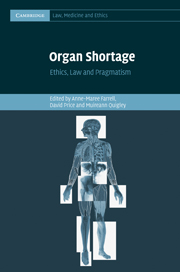Book contents
- Frontmatter
- Contents
- List of figures
- List of tables
- Contributors
- Acknowledgements
- List of abbreviations
- Table of cases
- Table of legislation
- Part I Setting the scene
- Part II Current issues affecting organ shortage
- Part III Strategies for addressing organ shortage
- 6 Incentivising organ donation
- 7 Making the margins mainstream: strategies to maximise the donor pool
- 8 The allocation of organs: the need for fairness and transparency
- 9 Ante-mortem issues affecting deceased donation: an ethico-legal perspective
- Part IV Comparative perspectives
- Part V Current reform and future challenges
- Bibliography
- Index
9 - Ante-mortem issues affecting deceased donation: an ethico-legal perspective
from Part III - Strategies for addressing organ shortage
Published online by Cambridge University Press: 29 March 2011
- Frontmatter
- Contents
- List of figures
- List of tables
- Contributors
- Acknowledgements
- List of abbreviations
- Table of cases
- Table of legislation
- Part I Setting the scene
- Part II Current issues affecting organ shortage
- Part III Strategies for addressing organ shortage
- 6 Incentivising organ donation
- 7 Making the margins mainstream: strategies to maximise the donor pool
- 8 The allocation of organs: the need for fairness and transparency
- 9 Ante-mortem issues affecting deceased donation: an ethico-legal perspective
- Part IV Comparative perspectives
- Part V Current reform and future challenges
- Bibliography
- Index
Summary
Whilst living donation makes an increasing contribution to rates of organ transplantation in the United Kingdom (UK), its obvious clinical limitations, along with lack of progress with stem cell research or xenotransplantation, mean that transplantation overall continues to rely heavily on the retrieval of organs from people who have died. Deceased donation is associated with a unique constellation of clinical, ethical and legal challenges that represent real obstacles to achieving any increase in the number of deceased organ donors. For instance, whilst the distinction between life and death appears self-evident, the moment of transition from one state to the other remains a matter of some debate. Furthermore, even if we have interests that survive our deaths, our nature – and thus what constitutes, for example, harm – changes radically post-mortem. While we live, our rights in medical law stem from our interests and their protection. Presumptively, individuals are best placed to judge their interests: hence requirements of consent and the right of patients to choose between interventions or ultimately to refuse any intervention. Although matters become more complicated for patients without decision-making capacity, the law maintains that:
interests should be protected;
a plurality of values underpin interests, so benefit and harm do not hold static or universal senses; and
default positions on benefit and harm may be ignored for patients lacking capacity where there is evidence that their values underpin a particular best interests judgement requiring this.
This chapter addresses the following central questions: if death is imminent, but a patient is still alive, how does this constrain how we may treat him or her, and understand his or her best interests?
- Type
- Chapter
- Information
- Organ ShortageEthics, Law and Pragmatism, pp. 136 - 148Publisher: Cambridge University PressPrint publication year: 2011
- 2
- Cited by



